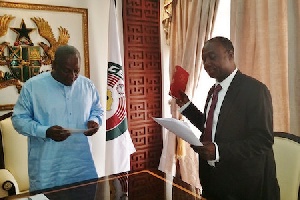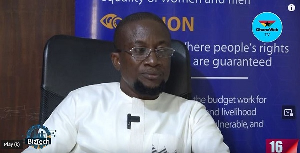The Civil Society Platform on Oil and Gas, a policy advocacy group in Ghana's energy sector, is challenging government to look beyond power barges for solutions to the crippling energy crisis facing the country.
In a briefing paper, issued after the group's chairman, Dr Steve Manteaw, took part in a familiarisation tour of the facilities of Karpowership in Lebanon and Turkey, the group noted that the government will need the support of all Ghanaians to fix the problem, and that the surest way to rally the people behind the government in search of a viable solution will be to keep faith with the people and provide veritable information at all times to properly inform public discourse on policy options.
Two things the group says are critical to finding a lasting solution to the power nemesis that confront the country are: money – to invest in the generation capacity; and reliable supply of moderately priced fuel. The generation capacity, the group concedes, seems to be receiving the right attention as the government has set out to promote greater participation of IPPs in the sector.
However, it cautions government not to act in desperation and commit blunders that will come to create even bigger problems for the country.
It warns in particular, against the introduction of coal into the energy mix. “We can understand the economic imperatives that must be driving this idea, but we also understand the environmental consequences, which by far outweighs the economic benefits” the group argues; adding that, “The age of coal is simply over, and coal plants are being shut down in many places for health and environmental reasons”.
The briefing paper urges in favour of the construction of plants that use Heavy Fuel Oil (HFO), the type on offer by Karpowership. The technology for this type of plants is available on the market. HFOs are said to be far cheaper source of fuel than Light Crude Oil (LCO) and slightly more expensive than gas. Of course HFO being fossil fuel also comes with its own environmental concerns, but those are much more containable than coal.
The Platform also wants government to consider revising the country's renewal energy policy to provide incentives to those who may want to generate their own power for household use. The revised policy should provide tax concessions to companies to establish solar panel manufacturing plants here in Ghana, using the abundance of silica sand in Aboso (Western Region) as a major attraction.
The policy should also grant credit units to those who generate in excess of their requirement and supply their surpluses to the national grid. This means, appropriate meters for computing the quantum of reverse flow to the grid would have to be brought in for the purpose. The credit should enable consumers to buy back their power when for whatever reason they are unable to meet their requirement. If implemented, the proposed policy will have the effect of reducing the burden on the national grid and making more power available for industry use.
The group posits that the current energy mix has a very narrow spectrum and breeds avoidable competition between power for domestic use and power for industrial production. It therefore calls on government to take a serious view of the suggestion to broaden the mix, in favour of renewables, as there is usually no fuel costs associated with this source of energy.
The Oil and Gas Platform argues that the Turkish powerships, popularly referred to in Ghana as emergency power barges, are essentially not an emergency solution to the challenge the country faces. The Turks, according to the Oil and Gas Platform, offer medium - long term “bridging power' solution to give its clients the space to deal with their power shortfall in a more sustainable way, and so the description of the powerships as 'emergency' cannot be appropriate. It is misleading to say the least.
This revelation, the groups says, raises questions about why authorities in Ghana will describe the powerships as “emergency” solutions and whether the erroneous description was done deliberately or ignorantly.
The group is again unenthused about the President's assertion during this year's May Day parade that the power crisis that faces the country has nothing to do with finance, and affirms with “due respect to the President”, that this cannot be a reflection of the truth, as they have come to know it.
Finance or lack of it, the group affirms, has something to do with the power crisis that confronts the country.
It cites a 2013 report issued by the World Bank, titled: “Energising Economic Growth in Ghana: Making the power and petroleum sectors rise to the challenge”, in which the Bank cautioned that “At a time when the Ghanaian economy is achieving sustained growth in excess of six per cent annually, with ambitions to raise this further, there is a risk that misguided and inappropriate policies would lead to the power sector becoming a drag on the economy.”
It goes on to disclose that, in its diagnosis of the problems confronting the energy sector, the Bank identified two challenges arising from forces external to the power sector.
The challenges, it said, were lack of adequate and secure quantities of reasonably priced fuel for power generation, and the lack of adequate public funds to finance the sector's investment requirements.”
Furthermore, the group says during last week's visit to Turkey, the Ghanaian delegation discovered that, even though the Power Purchase Agreement (PPA) between the Electricity Company of Ghana (ECG) and Karpowership was signed in June 2014, it was only in April 2015 that a financial closure was reached in respect of just one barge. The second barge, according to the group, awaits financial closure.
The World Bank report and the delay in reaching a financial closure on the Turkish powerships, in the view of the Oil and Gas Platform, speaks to a liquidity challenge on the part of ECG, and for that matter the Government of Ghana, and which do not corroborate the President's claim that money is not a problem in our search for solutions to 'dumsor'.
The Oil and Gas Platform acknowledges that to restore health to the books of ECG will require government to make good its debt to the company, but at the same time concedes that this will be a difficult demand to make as government is currently going through a fiscal squeeze. The situation, the group says, call for innovative approaches to raising the badly needed revenue to make ECG solvent enough to make the needed investments in its operations. The group points out that the rationale behind the now controversial policy to levy students for the utilities they consume has everything to do with ensuring the solvency of ECG and the other utilities. But, argues that somehow the communication has been so sloppy, and so not succeeded in garnering public support. It argues further that public sympathy could have been secured if government had been candid about the challenge it faces and engaged the citizenry on the available policy options. A public debate on the policy, in the view of the Platform would have cured the policy of its arbitrariness and inequitable traits, as it might have resulted in ensuring that ministers and other public functionaries who continue to enjoy free power, even though by their economic status, are capable of paying for the power they consume, are brought into this new policy.
We want opportunity to discuss the financials of the Karpowership Deal The group says the trip to Lebanon and Turkey was useful in satisfying itself of the technical capability of Karpowership, and of the cutting edge solution they are offering, but noted that, it did not afford it the opportunity to discuss the financial arrangements underpinning the contract. It says it sought to understand the financial guarantees being sought by Karpowership, the tax provisions relative to the deal etc. but the Turkish company was uncomfortable about making any disclosure in that regard. That, the group says is understandable. “The company owes that responsibility to its board and shareholders, and that the responsibility to disclose to Ghanaians the financial details of the contract rests with the Government of Ghana, having represented the people in this transaction.” the briefing paper affirms.
It is therefore challenging the ECG and the Power Ministry to fully disclose the Power Purchase Agreement (PPA) it has entered into with Karpowership and to take urgent steps to bring the contract to Parliament for scrutiny and approval.
General News of Sunday, 10 May 2015
Source: Public Agenda

















